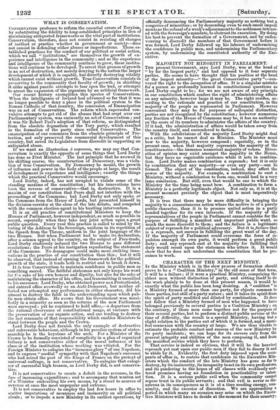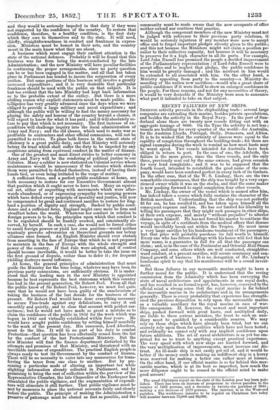CHARACTER OF THE NEXT MINISTRY.
IF the Ministry which is in the slow process of formation should prove to be a "Coalition Ministry," in the old sense of that term, it will be a failure ; if it were a practical Ministry, comprising the ablest men without distinction of party, and setting itself to do the work plainly to be done at this present season, it would be exactly what the public has been long desiring. A " coalition " is a Ministry formed of more than one party, for objects common to those parties, but still of a party nature ; and it takes its spirit from the spirit of party modified and diluted by combination. It does not follow that a Ministry formed of men who happened to have belonged previously to several parties is a Coalition Ministry; on the contrary, if those men come together not for the purpose of their several parties, but to perform a distinct public service at the time of difficulty, the result is a special Ministry, having but a slight relation to the parties out of which it is formed, and a mani- fest connexion with the country at large. We are thus ifnable to estimate the probable conduct and success of the new Ministry by its party incidents ; we can hope for its success only from the general integrity and abilities of the men composing it, and from the manifest service which they have to perform. That service is indeed so obvious, that it will be the heaviest reproach yet cast upon our public men if they fail to descry it and to abide by it. Evidently, the first duty imposed upon the occu- pants of office is, to restore that confidence in the Executive Min- isters which the conduct of the late Ministry has gone so far to destroy, by its insincerity, its incapacity to act on its own professions, and its pandering to the hopes of all classes with recklessly scat- tered promises having nd foundation in practicability or inten- tion. It is a serious public evil when the community millet repose trust in its public servants; and that evil is never so dis- astrous in its consequences as it is at a time needing energy, una- nimity, and the exercise of discretion. We are approaching a period in which many an occasion may arise on which the Execu- tive Ministers will have to decide at the moment for their country;
and they would be seriously impeded in that duty if they were not supported by the confidence of the country. To restore that confidence, therefore to a healthy, condition, is the first duty which they .owe to themselves and to the state. It will need, chiefly, straightforwardness in conduct and frankness in expres- sion. Ministers must be honest in their acts, and the country must in the main know what they are about.
A business which must engage their earliest attention is the state of the national defences. Probably it will be found that this business was far from being the worst-conducted by the late Administration; and the new Ministry will have peculiar facilities in continuing the proper arrangements, since no party question can be or has been engaged in the matter, and all that has taken place in Parliament has tended to insure the cooperation of every section. But some portions of this business will involve a greatly increased expenditure ; and it is very desirable that particular frankness should be used with the public on that subject. It is but too evident that the late Ministry had kept back information as to the probable extent of the outlay. But there is a more abiding reason why explicit statements must be made public. In- telligence has very greatly advanced since the days when we were obliged to provide a large military and naval expenditure ; and although the public will be willing to find the money necessary for placing the safety and honour of the country beyond a chance, it will expect to know for what it has paid ; and it will absolutely re- fuse to pay that which is not necessary. The first increase of ex- penditure will challenge inquiry into the fiscal administration of Army and Navy; and the old abuses which used to make war so profitable to contractors and other oldsl connexions will not be permitted to revive. To /dace both forces in the utmost state of efficiency is a great ramie duty, and that Ministry will seriously betray its trust which shall suffer the duty to be impeded by any suspicions arising from equivocal conduct in the matter of finance.
One of the greatest and most direct strides to better economy in Army and Navy will be the rendering of political justice to our Colonies. Many a soldier is now stationed on Colonial service whose maintenance would be unnecessary if the colonies which absorb them were permitted to defend themselves, instead of having their hands tied, or even being irritated to the verge of mutiny.
A sufficient force, and a perfect public confidence at home, are both necessary to restore for our Executive Government abroad that position which it ought never to have lost. Many an equivo- cal act, either of coquetting with movements which were after- wards abandoned, or of expressing sympathy for usurping powers which have defied every principle of morality and justice, will now be compensated by great and continued sacrifice to restore for Eng- land a position of dignity and strength. Backed by public confi- dence and a sufficient force, England might once more be firm and steadfast before the world. Whatever her conduct in relation to foreign powers is to be, the principles upon which that conduct is to be regulated should be y avowed, and consistently ob- served, by herself. In such a ease, she would not be forced either to assail foreign powers or yield her own position—would neither wantonly provoke adversaries on theoretical grounds nor betray alliances once formed. An English Minister should ever abstain from asserting in the face of Europe that which he is not prepared to maintain in the face of Europe with the whole strength and power of the country. If that rule were adopted, and if contest should become inevitable, it weakl be better to take the issue on the first ground of dispute, rather than to defer it; for frequent yielding destroys moral influence.
At home the general principles of administration that must guide the Ministry for the time being, whatever may have been its previous party connexions, are sufficiently obvious. It is under- stood that the leading man in the new Ministry is appointed because he best represents the best statesman which this country has had in the present generation, Sir Robert Peel. From all that the public know of Sir Robert Peel, however, we must feel quite sure that he would not have been guilty of the anachronism of taking the business of the last decade for the business of the present. Sir Robert Peel would have done everything necessary to secure Free-trade against any defalcations, to carry it out smoothly and quietly, and to close that account with perfect cor- rectness; but he would not have made so great a mistake as to claim the confidence of the public in 1852 for the work which was begun in 1842 and virtually established within four years. He would have sought public confidence by setting himself manfully to the work of the present day. His successor, Lord Aberdeen, must do the like. It will be no part of his duty to combat Protection—that question has been effectually erased from the list by the conduct of the last Protectionist Ministry. But the new Minister will find the finance department disturbed by the attempts and promises of that Ministry, and threatened with an inevitable increase of expenditure. The practical English people is always ready to test its Government by the conduct of finance. There will be no necessity to enter into any manoeuvres for trans- ferring the taxes from one class to another. But by pre- suming a particular mode of altering an important tax while slighting information already collected in Parliament, and by promising to bring the cost of collection within the purview of the &presentative Chamber, the late Chancellor of the Exchequer has stimulated the public vigilance, and the augmentation of expendi- ture will stimulate it still further. That public vigilance must be met by measures to place the national accounts fairly and clearly before the public. The principle of making the Administration a Preserve of patronage must be abated as fast as possible, and the community must be made aware that the new occupants of office neither extend nor continue that practice.
judged Althea h the component members of the new Ministry must not
be with reference to their previous party relations, it would seriously injurious if any member were now to accept
office and to forget important pledges already given to the public ; and this not because the Ministers might not claim a position pe- culiar to their collective capacity, but because it will be necessary to preserve for it a high character in all its parts. For example, Lord John Russell has promised the people a decided improvement of the Parliamentary representation : if Lord John Russell were to accept office and to neglect that pledge, the public confidence in him would be greatly damaged ; and the mistrust in. him would be extended to all associated with him. On the other hand, a Ministry appealing from party to the country—a Ministry de- manding of the nation new sacrifices—would win a great share of public confidence if it were itself to show an enlarged confidence in the people. For these reasons, and not for any necessities of theory, it would be very desirable if the Ministry were soon to announce what part it intended to take on that subject.



























 Previous page
Previous page